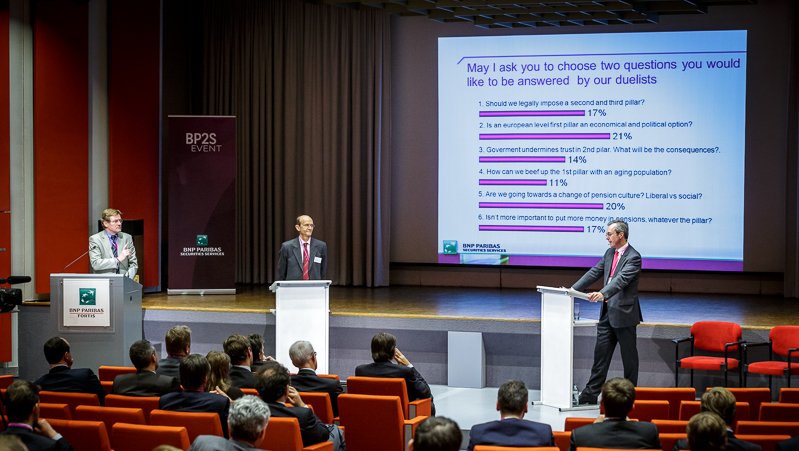BNP Paribas Securities Services hosts deep-dive duel of economists
On 22 November 2012 BNP Paribas Securities Services clients and staff had the good fortune to attend a most exciting duel between two foremost economists, Eric De Keuleneer and William De Vijlder. The discussion was moderated by Johan Van Overtveldt, chief editor of Trends.
See our photo gallery below for a brief presentation of the speakers.
Europe is facing an exceptional financial and sovereign debt crisis. The debt woes that began in Greece and Ireland a few years ago have magnified into Europe’s sovereign debt crisis, driven by fear that debt owed by entire countries will not be repaid. This unprecedented situation is nothing like the previous crises, leading more than ever to different points of view on what steps in economic policies should now be taken by governments.
Debating on possible scenarios to get out of the financial and economic crisis, the worst in a couple of decades, William De Vijlder (BNP Paribas Investment Partners, CIO Strategy & Partners) and Eric De Keuleneer (Credibe) were first asked to discuss the relevance of resorting to large-scale sovereign debt restructuring – rolling current sovereign debt to a very long term with a very low interest rate in order to lower annual deficits over time. The debt problem is compounded by the mounting burden of aging population and tepid GDP growth prospects. However, debt to GPD ratio in Europe is still lower than in the US and Japan. Public debt restructuring would enable governments to regain access to the financial markets quickly. On the other hand, the current status quo forces national governments into stepping up budget discipline efforts and making progress on policy convergence. As part of the debate, crucial questions on how to restore market confidence in sovereign paper as a risk-free asset and to consolidate the euro as a stable and strong currency were also raised.
Another main question turned attention to the Belgian pension system, more precisely the pros and cons of beefing up the first pillar (pensions paid by the government). Ideally, a strong first pillar would enable governments and citizens alike to just ‘forget’ about the second and third pillars. However, this would entail a tremendous cost. So, shouldn’t the Belgian government rather focus on promoting company pension plans and individual savings instead? At any rate, the two economists agreed that funding the first pillar through real assets would certainly be a good idea. Incidentally, it was remarked that the US, optimistic by nature, is confident it has the ability to set its economy on a healthy path, hence, to weather the current crisis like it did for previous disasters. However, the US may be overdoing it with its successive rounds of ‘quantitative easing’ (read ‘money creation’).
While both economists agreed that macroeconomic policy should promote export and international competitiveness, they diverged on whether the labour market and the governance thereof in Belgium is really a major issue. Is the (un)ability to generate economic growth in the long term not even more crucial?
The audience then invited the debaters to expound on the cost of labour in Belgium vs. other countries. In terms of labour market agility, the sizeable gap between gross and net wages and distortions in the financing of the social security system, partly entailed by black and grey work, may be even bigger problems than the automatic indexation of wages.
Incidentally, it was pointed out that in the midst of the sovereign debt crisis, some countries, including in Southern Europe, still have pretty wealthy citizens who could easily finance the public-sector debt if they had sufficient ground to trust it.
Another question raised by the audience was about taxing capital income vs. taxing labour income. In this respect, it was underlined that in Belgium, not all financial products are subject to income tax.
The dueling economists’ commentary about these questions and other aspects during the meeting was frank and insightful at all times. It was a duel characterised by mutual respect.
The setup was interactive, with participants using voting handsets to ask questions and eventually expressing their preferences as to which of the proposed questions should be actually addressed by the debaters.
This kind of debate is important because it clearly puts crucial issues into a broad perspective. William De Vijlder and Eric De Keuleneer articulated their thoughts very well, so the audience could see why they believe the things they advocate. They have largely similar views about the economics of most issues (‘what is’) but they differ in how they believe the government should address them (‘what should be’).The event was compelling not only as a debate between two distinctive economic thinkers but also because they skillfully reconstructed the economic and political context which led to the current crisis.
Beyond some different views of wisdom about making economic policy, underlying Eric De Keuleneer’s and William De Vijlder’s analysis are vital questions during a time when the stakes are very high. While time was too short to propose specific courses of action on all issues raised, both economists agreed that European economies must recognise their structural weaknesses while striving for more sustainable development models and more EU convergence on financial, economic and tax policies. They concluded the debate by noting the need for more creative thinking and discipline in dealing with the financial and economic crisis.
- BNP Paribas Fortis
- Economy
- Real Estate
